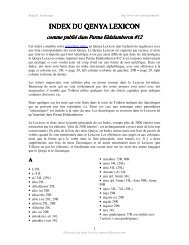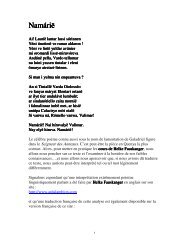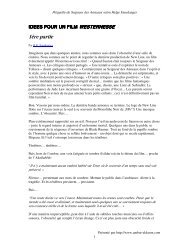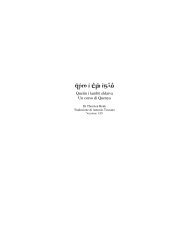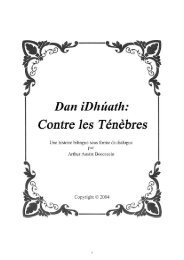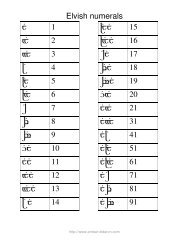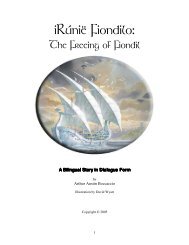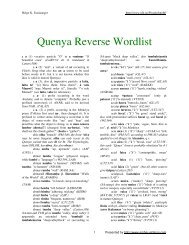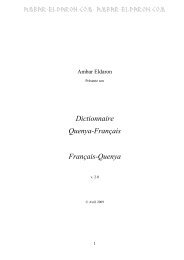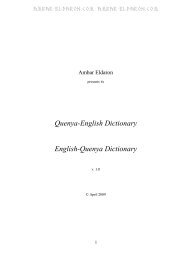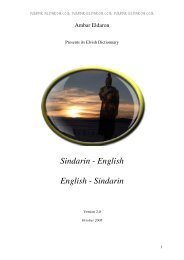English – Quenya - Ambar Eldaron
English – Quenya - Ambar Eldaron
English – Quenya - Ambar Eldaron
Create successful ePaper yourself
Turn your PDF publications into a flip-book with our unique Google optimized e-Paper software.
Helge K. Fauskanger http://www.uib.no/People/hnohf/<br />
<strong>–</strong> The word ambar, usually translated "world", is<br />
also associated with "home, dwelling" in one<br />
source. <strong>–</strong>Silm:408, 428, VT46:13<br />
HOMESTEAD osta <strong>–</strong>LT2:336<br />
HONEY lis (liss-). In a far earlier source,<br />
reproduced in LT1:262, the word for "honey" was<br />
nektë. This would however become nehtë in<br />
LotR-style <strong>Quenya</strong>, since Tolkien later decided<br />
that kt becomes ht in <strong>Quenya</strong>, and in its new<br />
form nehtë the word turns up in the Etymologies<br />
with the slightly modified meaning "honeycomb".<br />
(Note: a homophone means "spear-head, gore,<br />
wedge, narrow promontory".) HONEY-BEE nier,<br />
nion <strong>–</strong>LIS, LT1:262, VT45:38, GL:60<br />
HOOD telmë (covering) <strong>–</strong>TEL<br />
HOOK ampa, atsa (claw, catch);<br />
HOOKED rempa (crooked) <strong>–</strong><br />
LotR:1157/VT47:20, GAT, REP<br />
HOPE (noun) estel <strong>–</strong>WJ:318 (where it is<br />
stated that this word was used in <strong>Quenya</strong> as well<br />
as in Sindarin. Here the word is defined as<br />
"'hope', sc. a temper of mind, steady, fixed in<br />
purpose, and difficult to dissuade and unlikely to<br />
fall into despair or abandon its purpose". In<br />
MR:320, estel is translated "trust".)<br />
HORDE horma (host) <strong>–</strong>LT2:341<br />
HORN rassë, rasco ("especially on living<br />
animal, but also applied to mountains". Cf.<br />
Rasmund "horned bull" in Letters:423 [this<br />
seems like Sindarin rather than <strong>Quenya</strong>] and<br />
Arfanyaras, Arfanyarassë "high white-shining<br />
peak [*horn]", alternative name of Taniquetil),<br />
romba (so in Etym and one place in WJ [p. 400:<br />
romba = "horn, trumpet"] but on p. 368 róma is<br />
used for "horn", though this is glossed "trumpetsound"<br />
in Etym), HORN OF ULMO hyalma<br />
(shell, conch), tildë (point), (horn of animal:)<br />
tarca (probably obsoleting taru in LT2);<br />
HORNED tarucca (perhaps obsoleted together<br />
with taru), THE HORNED Tilion (a name of the<br />
Moon) <strong>–</strong>RAS/VT46:10, WJ:403/416,<br />
ROM/WJ:401 contrast 368, SYAL, TIL, TARÁK,<br />
LT2:337,347, Silm:438<br />
HORRIBLE norta <strong>–</strong>VT46:4<br />
HORROR norto (glossed "a horror").The<br />
verb rucin is glossed "I feel fear or horror" (1st<br />
pers. aorist), constructed with "from" of the<br />
object feared (e.g. *rucin Orcollon "I fear Orcs")<br />
<strong>–</strong>VT46:4, WJ:415<br />
HORSE rocco (defined as "swift horse for<br />
riding" in Letters:382, "swift horse" in VT46:12),<br />
olombo (but since Tolkien subsequently<br />
changed the relevant stem from LOB to LOP, we<br />
should perhaps read *olompo, compare lopo in<br />
an earlier source), mairo; HORSEMAN roquen<br />
(rider, knight) <strong>–</strong>ROK/Letters:282, 382, VT45:28,<br />
PE16:132, GL:56, WJ:372/UT:282<br />
HOST rimbë (crowd), horma (horde),<br />
liyúmë <strong>–</strong>RIM/Letters:178, 382, LT2:341,<br />
VT48:32<br />
HOSTILE cotya <strong>–</strong>KOT<br />
HOT saiwa; BLAZING HOT úrin (Úrin is<br />
also a name of the Sun) <strong>–</strong>LT1:248/265, LT1:271<br />
HOUND huan (hún-); HOUND OF CHASE<br />
ronyo <strong>–</strong>KHUG (see KHUGAN), ROY<br />
HOUR lúmë (so translated in LotR and in<br />
VT43:34; in Etym the gloss is simply "time".<br />
Allative lúmenna is attested. Note: lúmë also<br />
means "darkness".) THIS HOUR #sillumë<br />
(isolated from the ablative sillumello “from this<br />
hour”) <strong>–</strong>LU, LotR:94, WJ:367, VT44:35<br />
HOUSE coa (prob. the most neutral word),<br />
opelë (walled house), car (card-) (building),<br />
nossë (clan, family, kin, people) (LT2:336 gives<br />
indo "house" and os(t) "house and cottage";<br />
these words are probably obsolete <strong>–</strong> in Tolkien's<br />
later <strong>Quenya</strong> indo means "heart", while osto<br />
means "city". The term indor "master of house"<br />
can hardly be valid either.) LIGHT OF THE<br />
HOUSE coacalina (a metaphor for the soul [fëa]<br />
dwelling inside the body [hroa]) <strong>–</strong><br />
WJ:369/MR:250/VT47:35, PEL(ES), KAR,<br />
NŌ/LT1:250, 343, MR:250<br />
HOW manen <strong>–</strong>PM:395<br />
HUE quilë (colour) <strong>–</strong>QL:77%<br />
HUGE haura <strong>–</strong>PE17:115<br />
HUMAN firya (lit. *"mortal"; nominal pl.<br />
Firyar is attested) <strong>–</strong>PHIR, WJ:219<br />
HUMBLED nucumna <strong>–</strong>SD:246<br />
HUMP tumpo (stem *tumpu-),<br />
HUMPBACK cauco, HUMPED cauca (bent,<br />
crooked) <strong>–</strong>TUMPU, LT1:257<br />
HUNGRY maita <strong>–</strong>VT39:11<br />
HUNT (noun), HUNTING roimë (the<br />
misreading "raime" occurs in the Etymologies as<br />
printed in LR; see VT46:12 for this correction).<br />
No verb "to hunt" is given in Etym, but roita-<br />
"pursue" is derived from the same stem and can<br />
probably be translated *"hunt" as well. LT1:260<br />
has rauta- "hunt". <strong>–</strong>ROY 1<br />
HURL, see FLING%<br />
HURT (vb) mala- (pain) <strong>–</strong>QL:63<br />
HUSBAND venno (the published<br />
Etymologies gives "verno", but according to<br />
VT45:7, this is a misreading of Tolkien's original<br />
manuscript); HUSBAND AND WIFE veru<br />
(married pair <strong>–</strong> but in a late source, veru is also<br />
used for “husband” alone, the counterpart of veri<br />
“wife”) <strong>–</strong>BES, VT49:45<br />
HUSH quildë (rest, quiet) <strong>–</strong>GL:23<br />
Wordlist last updated July 5th, 2008 42 Presented by http://www.ambar-eldaron.com



